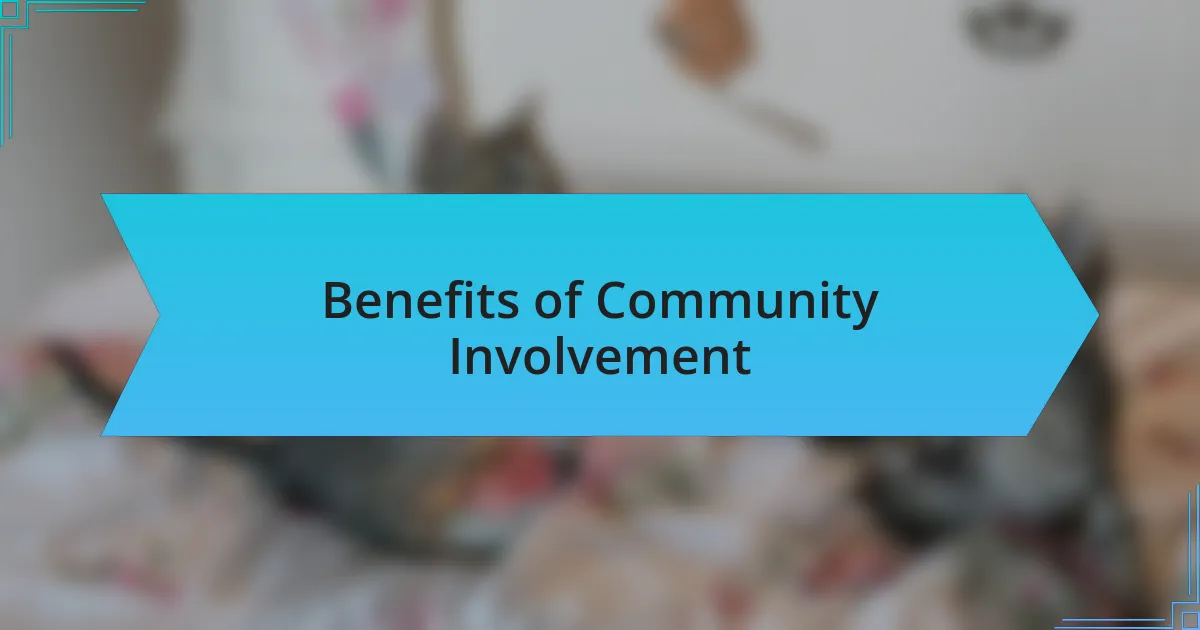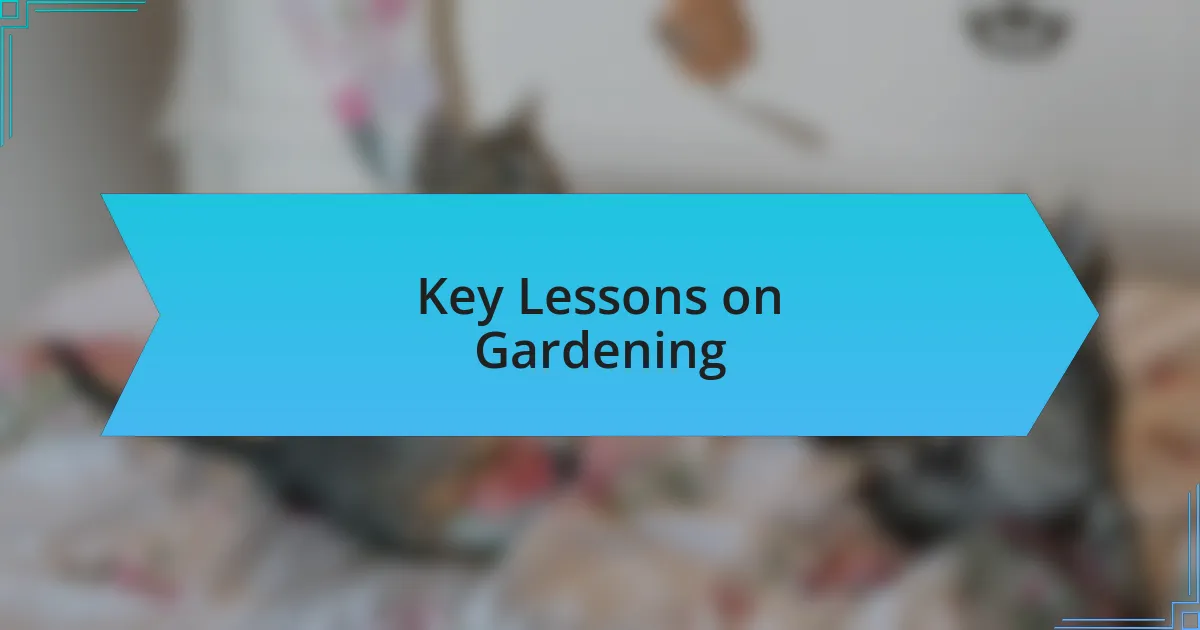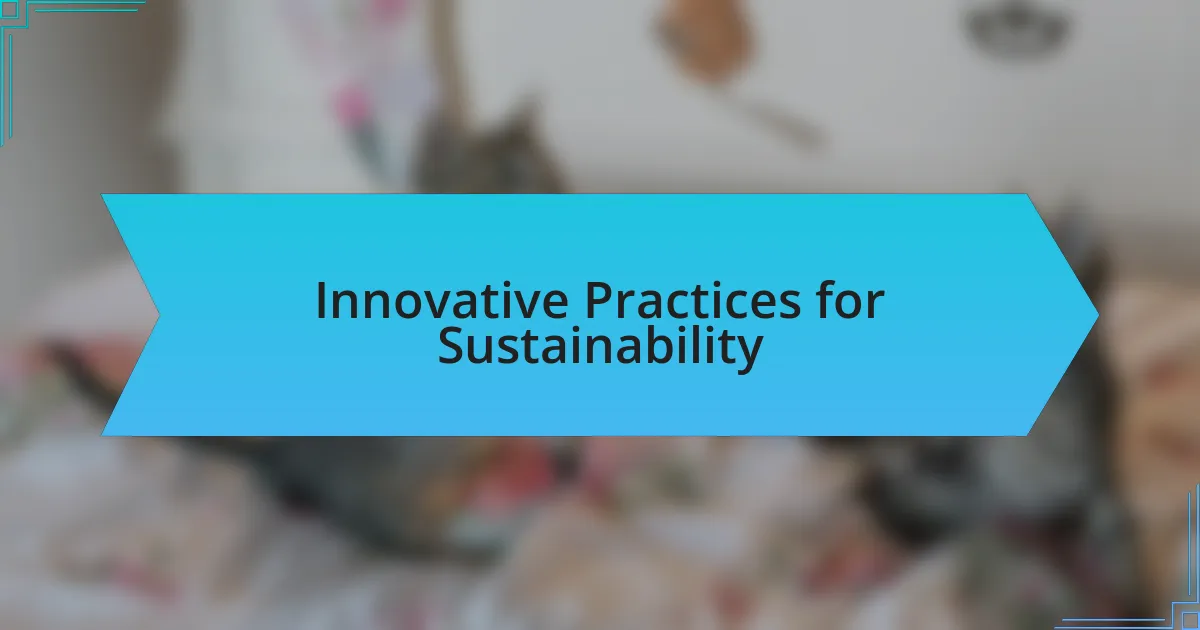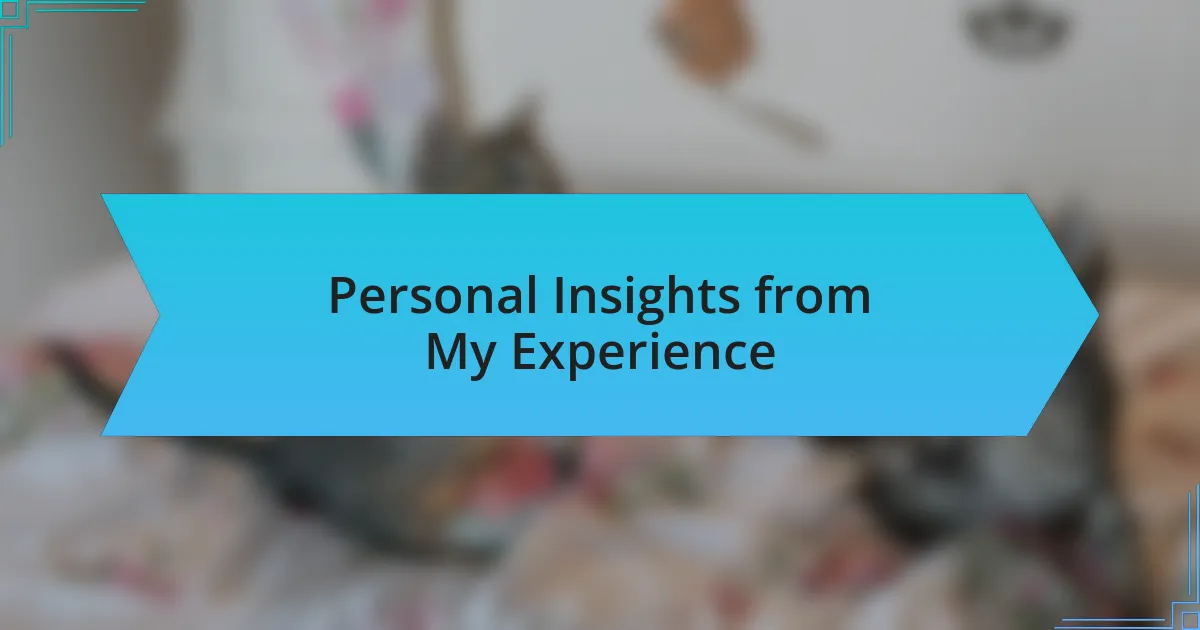Key takeaways:
- Community gardens foster relationships and a sense of belonging, promoting a shared purpose among diverse individuals.
- Animal protection advocates empathy and kindness, emphasizing the interconnectedness of ecosystem health and humane treatment of animals.
- Participating in community projects encourages personal growth and reinforces collective impact towards common goals, such as environmental sustainability.
- Innovative gardening practices, like rainwater harvesting and using native plants, promote sustainability and resilience in the environment.

Understanding Community Gardens
Community gardens serve as a remarkable intersection where nature and community spirit flourish together. I vividly recall my first experience digging my hands into the soil, feeling the rich, cool earth, and realizing how connected I was to my neighbors as we worked side by side. Have you ever noticed the sense of camaraderie that arises when people come together for a shared purpose? It’s something truly special.
These gardens aren’t just about growing vegetables; they play an important role in building relationships within the community. During my workshop, I saw friendships form over the shared labor of planting seeds and harvesting crops. Isn’t it fascinating how a few hours spent in the garden can break down barriers and foster a sense of belonging among individuals from diverse backgrounds?
Moreover, community gardens often act as educational hubs for sustainability and environmental awareness. I remember the excitement of attending a session on organic gardening practices, learning the benefits of composting and permaculture techniques. How does nurturing a small plot of land encourage us to think about the bigger picture of our planet? It’s experiences like these that highlight the importance of engaging with our environment and each other.

Importance of Animal Protection
The cruelty many animals face in our society highlights the urgent need for protection. When I think back to experiences at local shelters, I remember the eyes of a rescued dog, filled with hope and fear. It struck me then that every creature deserves a chance to thrive, and it’s our responsibility to ensure they have a safe environment. How can we stand by and let helpless beings suffer?
Animal protection broadens our understanding of coexistence. In my community garden workshop, I encountered students who were inspired to advocate for compassionate treatment of all living beings. The discussions around natural habitats and the impact of urbanization on wildlife were eye-opening. Have you ever considered how protecting animals also means preserving the delicate balance of our ecosystems?
Furthermore, animal protection fosters empathy and kindness in our communities. I remember a young attendee at the workshop who shared her love for cats. Her passion ignited a vibrant discussion about spaying and neutering to control stray populations. It reminded me that each small act of compassion contributes to a larger movement towards a society that respects all life—how comforting is it to know that our actions can bring positive change?

Benefits of Community Involvement
Being involved in community projects, like my experience at the garden workshop, creates a sense of belonging and connection. I remember chatting with a fellow gardener who shared stories about her own pets and their rescue journeys. This common ground fostered deeper relationships, showcasing how shared interests can unite us to a common cause.
Community involvement also leads to personal growth. During the workshop, I found myself stepping out of my comfort zone to lead a discussion on sustainable practices. The support and enthusiasm from attendees pushed me to become more knowledgeable and confident. Have you ever wondered how trying something new in a supportive environment can change your perspective? It certainly has for me.
Additionally, working together toward a common goal reinforces the impact we can have collectively. It was inspiring to see everyone come together to plant flowers that would support pollinators. This experience reminded me that when we unite our efforts, we can create positive outcomes, not just for animals, but for our entire environment. Isn’t it powerful to realize that our collective actions can lead to real change?

Key Lessons on Gardening
I quickly realized that gardening goes far beyond simply planting seeds; it’s about understanding the ecosystem. For instance, during the workshop, I learned the importance of companion planting, where certain plants enhance each other’s growth. I remember the moment when a fellow gardener shared how marigolds can naturally repel pests. It made me think—how often do we overlook natural remedies in favor of chemicals? This insight reshaped my approach to garden care.
One key takeaway was the significance of patience in gardening. I vividly recall the first time I planted a row of tomatoes, eagerly awaiting their growth. After weeks of nurturing, I felt a mix of frustration and hope as I saw tiny sprouts breaking through the soil. It dawned on me then that just like in life, commitment and perseverance in gardening can yield beautiful results. Have you ever experienced the satisfaction of nurturing something and watching it flourish?
Another invaluable lesson was the power of community knowledge. During group discussions, I was exposed to countless tips and tricks that I would have never discovered alone. There was a moment when someone shared a simple technique for composting. My initial skepticism turned into curiosity, leading to a more sustainable gardening practice. Isn’t it fascinating how sharing our various experiences can enrich our learning and ultimately benefit the environment?

Innovative Practices for Sustainability
Innovative practices for sustainability often stem from a willingness to experiment and share ideas. During the workshop, I remember the excitement when someone introduced the concept of rainwater harvesting. It seemed so simple yet revolutionary—collecting rainwater to irrigate gardens not only conserves resources but also reduces the strain on local water supplies. Have you ever considered how a simple setup like this could change the way we approach water use?
In one of the sessions, a participant demonstrated how to create a self-watering planter using recycled materials. They spoke about the joy of upcycling and how everyday items can find a new purpose. I couldn’t help but feel inspired as I envisioned transforming my old plastic bottles into planters. Isn’t it rewarding to find creative solutions that promote sustainability while also being resourceful?
Another idea that resonated with me was the importance of integrating native plants into our gardens. A passionate speaker shared their success story of replacing non-native species with local flora, which attracts beneficial wildlife while needing less water and care. Hearing their personal transformation sparked a realization: by making conscious choices in our gardening practices, we can cultivate not just beauty, but also resilience in our environment. Have you ever thought about how your gardening choices impact the larger ecosystem?

Personal Insights from My Experience
During the workshop, I vividly recall the moment a fellow participant shared their journey into organic gardening. Their passion was infectious, and I found myself reflecting on my own gardening practices. It dawned on me that growing my own vegetables could not only be a personal achievement but also a way to support more sustainable food systems. Have you ever pondered how your food choices ripple through the environment?
One lesson I took to heart was the role of community in sustainable practices. As we exchanged stories, I felt a deep sense of connection with others who shared my vision for a healthier planet. It was inspiring to realize that we are not just individuals working towards our own goals but part of a collective effort to protect our environment and uplift our communities. Isn’t it incredible how a simple workshop can foster such camaraderie?
Throughout the sessions, I was struck by the idea that small actions lead to significant impacts. When someone described the benefits of composting even kitchen scraps, it felt like a light bulb moment. The prospect of turning waste into nourishment for the soil resonated with me deeply. Have you considered how your waste could contribute to a more sustainable cycle of growth in your garden?